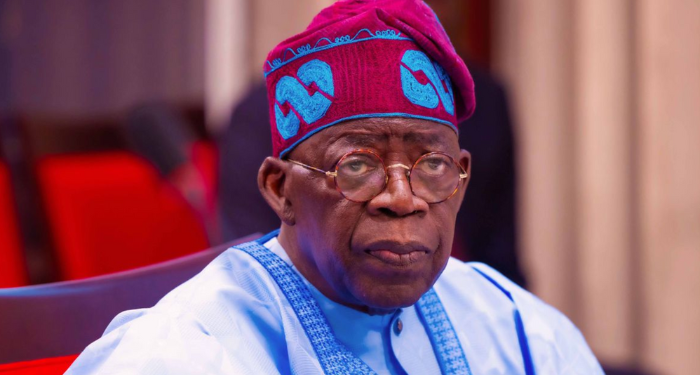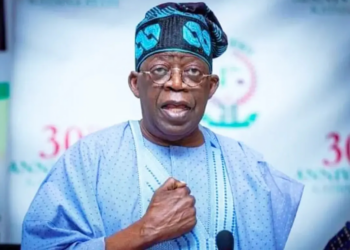- Over the past year, Nigeria’s health sector has faced severe challenges, including rising costs of medicines and the exit of major pharmaceutical firms.
- Despite the Tinubu administration’s efforts, such as increasing recruitment and promoting local production, the high costs and brain drain crisis continue to strain the healthcare system.
- The health budget increased from N1.16 trillion in 2023 to N1.33 trillion in 2024, but it still falls short of the Abuja Declaration’s target, highlighting ongoing funding inadequacies in the sector.
Bola Ahmed Tinubu was inaugurated as the President of Nigeria on May 29, 2023, introducing the “Renewed Hope” agenda.
Under this agenda, the Nigerian health sector, led by Professor Ali Muhammad Pate as the Coordinating Minister of Health and Social Welfare, has encountered significant challenges.
These include a severe brain drain, escalating costs of medicines, inadequacies in health insurance, the exit of major pharmaceutical firms, and fluctuating health budgets.
This feature article explores the major health issues Nigeria has faced over the past year and examines the government’s efforts to address these challenges.
Brain Drain
Since the Renewed Hope administration, Nigeria’s health sector has faced an intensifying crisis of brain drain, with a significant exodus of medical professionals seeking better opportunities abroad.
Several key developments highlight the ongoing crisis and the efforts to mitigate its impact:
- In November 2023, the House of Representatives responded to the resignation of 51 doctors from the Federal Medical Center, highlighting the severity of the brain drain crisis.
- The committee emphasized the need for better budgetary allocations and improvements in healthcare infrastructure to retain medical professionals within the country.
- The Registrar of the Medical and Dental Council of Nigeria revealed that only 58,000 doctors out of 130,000 renewed their licenses for 2024.
- Reports indicate a substantial increase in the number of Nigerian healthcare workers migrating to countries like the UK, Canada, and the US.
- This exodus is driven by better pay, working conditions, and professional opportunities abroad.
- The Nigerian Medical Association (NMA) noted that the country produces about 3,000 doctors annually, yet a significant number migrate, leaving the domestic healthcare system severely understaffed.
Efforts made by the Tinubu administration to combat brain drain
In response to the crisis, the Federal Government has implemented measures such as banning leave of absence for health workers and significantly increasing the recruitment of nurses, with plans to enrol up to 120,000 nurses by the end of the year.
These actions aim to fill the gaps left by migrating professionals and improve healthcare service delivery within the country.
- The Tinubu administration also approved a managed migration policy for health while looking for ways to solve the brain drain in the health sector.
“In the last 7 months, more than 100 medical graduates have secured residency in the United States and were issued certificates for them to be trained and return back to Nigeria,” the health minister stated.
- Increase in health workforce: The Renewed Hope government doubled the intake capacity of educational institutions.
“Enrolment quotas for medical schools, nursing schools and other health professional training institutions have increased significantly from 28,000 to 64,000 annually.”
- Local Efforts and State Initiatives: Lagos State has also taken steps to address the shortage by recruiting healthcare professionals into primary health centres and rehabilitating healthcare facilities.
- Efforts by the Nigerian government to address this issue have also included promises of better working conditions, increased salaries, and investments in healthcare infrastructure.
- However, these measures have been slow to materialize, and their impact remains to be seen.
- Some initiatives, such as the proposed National Health Insurance Scheme expansion and increased funding for primary healthcare, aim to improve the overall health system, but their effectiveness in curbing brain drain is uncertain.
Despite these efforts, many healthcare workers continue to express dissatisfaction with working conditions and remuneration. For instance, resident doctors in Enugu State issued a 14-day ultimatum demanding increased employment of doctors and better security measures, reflecting the ongoing struggles within the healthcare sector.
High costs of medicines and medical devices in Nigeria
The cost of medicines and medical devices in Nigeria has experienced significant increases since the inauguration of the Tinubu administration, creating further challenges for the already strained healthcare system.
Data from the National Bureau of Statistics reveal Nigeria’s inflation rate for the healthcare sector rose by 24.6% in the month of April up from 19.5% same period in 2023.
Different factors have contributed to the rising prices, including economic instability, currency devaluation, and disruptions in the global supply chain.
Meanwhile, the inflation rate in Nigeria was 22.41% before the Renewed Hope administration began, an 11.28% increase in just one year.
- The depreciation of the naira has made it more expensive to procure drugs from international suppliers, leading to increased prices for consumers and healthcare providers.
- As of June 21, 2023, the exchange rate stood at N755 to $1. Nearly a year later, it has surged to N1,484.75 to $1.
Reports by Nairametrics show that the cost of medicines and medical devices in Nigeria has seen substantial increases over the past year. Specifically:
- The cost of painkillers has surged by 200%.
- The prices of blood pressure monitors and related medications have doubled, increasing by 100%.
- The cost of foreign-manufactured medicines has skyrocketed, with some prices increasing by up to 1000%.
Tinubu’s government responses and policy measures to combat rising costs
Over the past year, the Nigerian government, under the leadership of Prof. Muhammad Ali Pate, has taken steps to address the rising cost of medicines and improve healthcare accessibility although most initiatives have not yet been implemented. Key efforts include:
- The government has been promoting the local production of Active Pharmaceutical Ingredients (APIs) to reduce dependency on imports.
- For instance, Emzor Pharmaceuticals is nearing completion of facilities to produce anti-malaria APIs, and the Fidson consortium is planning similar initiatives. This local production aims to reduce the overall cost of medicines in the long term.
- The Federal Government is planning to issue an executive order to control pharmaceutical pricing and lower the cost of essential medications.
- Once signed by the president, it will reduce barriers related to the import of raw materials and equipment for pharmaceuticals and medical devices. This order is part of broader efforts to stabilize drug prices and make healthcare more affordable.
- The government has said it is mobilising private capital to invest in healthcare infrastructure, equipment and human resources.
- However, in terms of hospital equipment and infrastructure, the federal hospitals have successfully executed 201 specific infrastructure projects in the last one year.
- Additionally, 179 specific pieces of important medical equipment were procured by the federal government and distributed across the six geopolitical zones.
The health sector agenda includes improving governance, strengthening health security, and enhancing health outcomes.
- These efforts are designed to save lives, reduce financial and physical pain, and improve the overall health of the population.
- The government has said that a reform is underway to expand the National Health Insurance Scheme (NHIS) to cover more Nigerians.
- By increasing coverage, the government hopes to reduce out-of-pocket expenses for healthcare, making it easier for people to afford necessary medicines and treatments.
- The Ministry of Health has secured significant funding pledges, including a $1 billion commitment from Afreximbank, a $932 million grant with GFATM, $200 million with a philanthropic foundation, $150 million announced by the Gavi alliance, to support healthcare initiatives.
- These partnerships are crucial for advancing the government’s medical industrialization agenda and ensuring sustainable healthcare improvements.
Nairametrics spoke to some health workers on the implementation of these policies by the government and the effect on the rising costs of medicines and medical devices.
“We are not really seeing any impact. Drug prices are still increasing nearly every month. Customers are complaining. The naira keeps depreciating so I don’t see how the costs of medicines or medical devices will fall,” Pharmacist Yetunde Oni told us.
Another health worker told us, “Patients are finding it very hard to keep up. Many are compromising and underdosing themselves just to make sure their drugs last longer.”
The exit of pharmaceutical firms from the Nigerian market
In the past one-year, major pharmaceutical companies, including GlaxoSmithKline (GSK) and Sanofi, as well as consumer goods giant Procter & Gamble (P&G), have exited the Nigerian market.
- This development has significantly impacted the availability and cost of medical and consumer products in the country.
- The primary reasons for these exits include economic instability, challenging business environments, and regulatory hurdles.
GSK announced its exit from Nigeria in July 2023, citing an increasingly challenging business environment and the need to streamline its global operations.
- The company has faced issues related to currency devaluation, regulatory challenges, and a high cost of operations in Nigeria.
- The departure of GSK, a major player in the pharmaceutical industry, has led to a significant increase in the prices of its products with prices going as high as 1000%, affecting access to essential medications for many Nigerians.
Following GSK’s announcement, Sanofi also decided to pull out of Nigeria opting for a third-party model.
- The French multinational company faced similar challenges, including currency instability, difficulty in repatriating profits, and stringent regulatory requirements.
- Sanofi’s exit further strained the pharmaceutical supply chain in Nigeria, leading to higher prices for its products and reduced availability of essential drugs.
In December 2023, P&G announced the closure of its production operations in Nigeria.
- The consumer goods company cited economic challenges, high operational costs, and difficulty in maintaining profitability as key reasons for its exit.
- The withdrawal of P&G has impacted the availability of many personal care products including health products like sanitary pads, leading to increased prices and a reliance on imported alternatives.
The exits of these major companies have had several consequences:
- The departure of GSK, Sanofi, and P&G has led to significant price hikes for their products. The cost of medications, in particular, has surged, making essential healthcare less affordable for many Nigerians.
- The exits have disrupted the pharmaceutical and consumer goods supply chains, leading to shortages and increased dependency on imported products. This has exacerbated the existing challenges in the healthcare sector, including access to essential medicines.
- The closure of operations by these companies has resulted in job losses and reduced economic activity in the affected sectors. The broader economic impact includes a negative effect on related industries and suppliers, further straining the Nigerian economy.
Efforts made by the Renewed Hope administration to combat the exit of pharmaceutical firms
In response to the exit of major pharmaceutical firms such as GlaxoSmithKline (GSK) and Sanofi, the Nigerian government has implemented some measures over the past year to stabilize the pharmaceutical market and mitigate the impact on drug prices and availability. These efforts include:
- Regulatory bodies such as the National Agency for Food and Drug Administration and Control (NAFDAC) have been strengthening their frameworks to support local manufacturing. This includes organizing workshops and capacity-building initiatives to prepare local manufacturers for producing APIs and other pharmaceutical products.
- The Health Minister, Prof. Muhammad Ali Pate has revealed that the government is actively seeking private capital to invest in healthcare infrastructure, equipment, and human resources.
- Pate announced that a Brazilian institution committed $240 million to establish a generic manufacturing plant in Nigeria. This initiative aims to restore confidence in the Nigerian healthcare system and reduce the need for medical tourism.
- NAFDAC is leading efforts to enhance the traceability and transparency of the pharmaceutical supply chain using advanced technologies. This initiative aims to prevent the distribution of substandard and falsified medicines and ensure the integrity of the supply chain.
Inadequacies in the health insurance scheme
Since June 2023, health insurance coverage in Nigeria has been a focal point of the government’s efforts to improve access to healthcare services and reduce the financial burden on citizens.
Despite these efforts, several challenges remain, including low enrollment rates and inadequate coverage.
- Enrollment in health insurance schemes remains low. Many Nigerians are still not covered by any form of health insurance, primarily due to a lack of awareness, affordability issues, and administrative barriers.
- For those who are enrolled, the scope of coverage is often limited. Many health insurance plans do not cover a comprehensive range of services, leaving beneficiaries to pay out-of-pocket for many essential treatments and medications.
Efforts by the government to improve health coverage
- The Nigerian government has been working to expand the NHIS to cover a larger portion of the population.
- This includes efforts to increase enrollment among informal sector workers and vulnerable populations who have traditionally been excluded from health insurance schemes.
- In October 2023, the government announced plans to broaden the NHIA coverage by introducing community-based health insurance programs aimed at reaching rural and underserved areas. These programs are designed to make healthcare more accessible and affordable for those who are most in need.
“1.8 million Nigerians are covered through the Vulnerable Groups fund at NHIA.”
- The government has said that the soon to be announced reforms of the NHIA will address coverage, including expanding private health insurance for the informal sector and strengthening the HMOs in tandem with the State Health Insurance Authorities (SSHIAs) in each state.
Comparison of health budget 2023 vs. 2024 (Tinubu’s administration)
2023 Health budget
Total allocation: In 2023, the Nigerian health sector received N1.16 trillion. This amount constituted about 5.31% of the national budget, marking a significant, yet insufficient, allocation given the needs of the healthcare system.
The budget primarily targeted improvements in primary healthcare, addressing health worker shortages, and upgrading medical infrastructure. Despite these intentions, the allocation fell short of the 15% target set by the Abuja Declaration, which aims to ensure adequate funding for healthcare across African nations.
2024 Health Budget (Renewed Hope Agenda)
Total allocation: The health budget for 2024 has been increased to N1.33 trillion, which is 4.6% of the total national budget of N28.7 trillion. While this represents a nominal increase, the percentage allocation decreased significantly. The allocated budget is also still significantly below the Abuja Declaration target of 15%.
- The 2024 budget places a strong emphasis on revitalizing primary healthcare centres, integrating diabetes care, and providing essential infrastructure such as solar energy and boreholes for healthcare facilities.
- Additionally, 21 billion is allocated for donor-supported funds and Gavi Immunisation, and N125.74 billion for the basic healthcare provision fund.
- The budget aims to enhance healthcare delivery through better infrastructure, increased local pharmaceutical production and expanded health insurance coverage to reduce out-of-pocket expenses for citizens.
While the Nigerian government has increased the amount of the health budget from 2023 to 2024, significant gaps remain in achieving the desired levels of health sector investment.
Addressing these gaps will require sustained policy reforms and increased financial commitments to ensure accessible and high-quality healthcare for all Nigerians.






















